| Fig. 2-1 |
Artist’s impression of ENVISAT in orbit.
SCIAMACHY is located at the upper right corner of the payload front panel. (photo: ESA) |
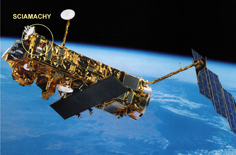
|
| Fig. 2-2 |
ENVISAT in ESTEC’s test facility. (photo: ESA)
|
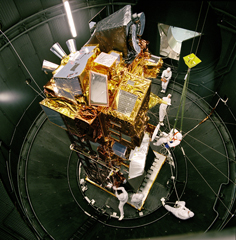
|
| Fig. 2-3 |
The total field of views of the atmospheric mission instruments. SCIAMACHY accesses nadir (1) and limb in flight direction (2). MIPAS
looks into anti-flight direction (3) and sideways (4) for special events monitoring.
GOMOS can observe setting stars in anti-flight and sideways direction(5). (graphics: DLR-IMF)
|
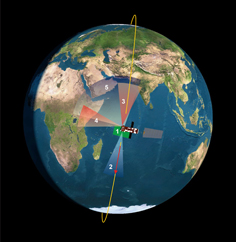
|
| Fig. 2-4 |
The coordinate
system specified in the ENVISAT mission. Platform and instruments use the same definitions. The red/blue areas right and left of the
orbit sketch the platform yaw steering. It gradually increases from pole to equator and decreases from equator to pole. The local -Y
axis always points to that side, where Earth rotation moves the surface towards the sub-satellite track. (graphics: DLR-IMF) |
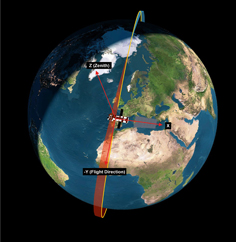
|
| Fig. 2-5 |
Schematic view of the ENVISAT on-board data handling. SCIAMACHY shares HSM resources with the other instruments generating low rate
data. Full orbit data of the Global Mission is stored on one of the solid state recorders and then disseminated to ground via X-band
or Ka-band. (graphics: DLR-IMF)
|
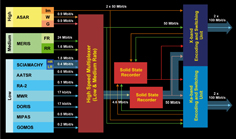
|
| Fig. 2-6 |
The European wide distributed ENVISAT ground segment (FOS: blue, PDS: red, SCIAMACHY specific DDS stations in the Commissioning Phase:
yellow). (graphics: DLR-IMF)
|
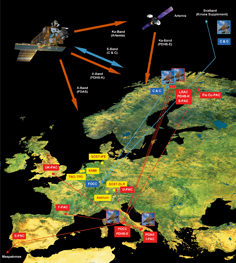
|
| Fig. 2-7 |
The ESA centres hosting major ENVISAT ground segment facilities with ESOC/Darmstadt (top) and ESRIN/Frascati (middle). The bottom
photograph shows ESA’s S-band and X-band station at Kiruna-Salmijärvi. (photos: ESA, S. Corvaja)
|


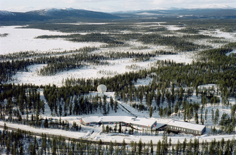
|